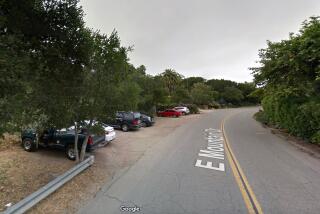Parks trail work gives young crew member new perspective
Irvin Centeno’s tagger friends would hardly know what to make of him on the Backbone Trail.
Wearing a hat, bandanna and sunglasses to protect against the blistering sun, he used a power hedger to mow down yards of buckwheat and smilo grass crowding the path. Hours earlier and miles away, above Chicken Ridge Bridge, he and two other California State Parks workers had bent over shovel, mattock and rake hoe to dislodge years’ accumulation of parched soil to fill a rut carved by mountain bikers and rainwater.
It’s grinding work, especially for a recovering troublemaker who grew up glued to his Xbox, snacking on bacon-wrapped hot dogs.
Like the uniformed Civilian Conservation Corps workers of the Great Depression, Centeno and his trail mates labor outdoors from dawn to dusk, breaking to eat and rest in temporary overnight camps. They rise in time to hit the trail by 6:30 a.m. and knock off 10 hours later, earning not quite $10 an hour.
Some early recruits couldn’t hack it. They complained about the heat, the food, the work and the overnight spike camp accommodations, and they didn’t stick around.
Centeno, 22, wasn’t one of them. “This work brings me a lot of peace of mind,” he said. “It gets me away from where I live.”
Centeno is “a good worker who came with really good references,” said Dale Skinner, a former horse trainer and heavy-equipment operator who is trails coordinator for California State Parks’ Angeles District. “It takes a special person to come out here with no facilities or cellphone service and work for 10 hours a day.”
Until recently, the parks agency depended primarily on volunteers to maintain and repair the main trail through the Santa Monica Mountains. Nine months ago, however, a $139,500 grant from the National Park Service enabled the agency to hire a six-person crew to whack overgrown brush and branches, fix drainage problems and shore up eroded trail edges.
The grant is expected to cover work on about 20 miles of the 65-mile Backbone Trail, helping make the long-neglected path between Pacific Palisades and Point Mugu navigable for hikers, horseback riders and cyclists.
Centeno, who sports a wispy beard and mustache, said that, until he dropped out of school in 10th grade, he regularly picked fights and skipped class. “I was mad at the world,” he said.
He “got the reality check the day I almost died.” When he was 15, he said, he went out alone “looking for trouble.” An assailant stabbed him in the stomach and struck his forehead with a hammer.
“Los Angeles Conservation Corps is where I got it together,” he said. In the corps, he added, he learned trail work and “really fell in love with it.”
Many of his fellow trail recruits are also urbanites from troubled backgrounds. Several had previously worked in the California Conservation Corps or the L.A. Conservation Corp groups that for decades have provided education, job training and backcountry work adventures.
Centeno found that performing physical labor, encountering rattlesnakes and sleeping under the stars could be far more satisfying than blasting video game avatars or spending mind-numbing weeks in jail, as he has done. He recently completed 200 hours of community service, a consequence of a tagging escapade. “I was caught red-handed,” he said.
Probably no one is more surprised than Centeno that, after several misguided years, he now spends many of his days and nights away from drug dealers and police patrols, making money “the righteous way.”
Accustomed to his neighborhood’s broken sidewalks, barren yards, intimidating iron fences and ferociously barking dogs, Centeno is at ease negotiating the dusty scree of the Backbone Trail.
Back in Mid-City, Centeno, wearing a gray fedora, and his dog, Ruby, made the neighborhood rounds one recent late afternoon. He pointed out 33Third (a street-art supply shop), medical marijuana parlors and chop shops. He couldn’t resist showing off his own graffiti on security gates and walls.
On a wall along Venice Boulevard, he studied a black-and-white portrait of a friend killed in a gang dispute.
Centeno’s parents are Mexican immigrants; his mother cleans houses and retail stores, and his father is a chef at a Marina del Rey restaurant. Centeno’s older sister graduated from UCLA and is a counselor.
Over a meal of homemade gorditas and nopales salad in the crowded kitchen of the family’s white Spanish-style house, Vicenta Lopez, Centeno’s mother, voiced relief about his newfound work ethic. She recalled a time when he came home from school bruised and battered. She went to the school to complain and learned that her son had been cutting classes.
On the front patio, in the evening light, Centeno, his mother and visitors sat on a faded brown couch and white benches to chat. Next door, musical neighbors created a cacophony of vocals and drums. Sirens wailed in the distance.
What a contrast to the chaparral-covered canyons where Centeno had been a few nights before, when Skinner boiled rice and grilled chicken and corn for the exhausted trail team. As the sun had set that evening, a marine fog had crept its way through the canyons, and birds and insects had produced the music.
“I love it,” Centeno said. “It’s very peaceful at night.”
More to Read
Start your day right
Sign up for Essential California for news, features and recommendations from the L.A. Times and beyond in your inbox six days a week.
You may occasionally receive promotional content from the Los Angeles Times.







